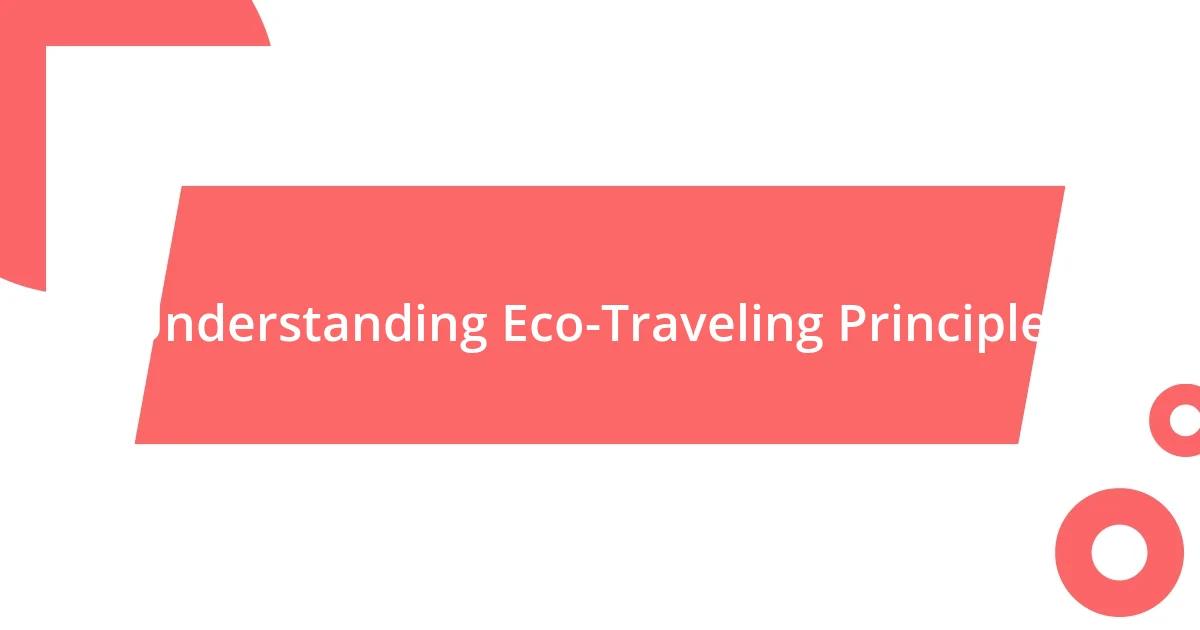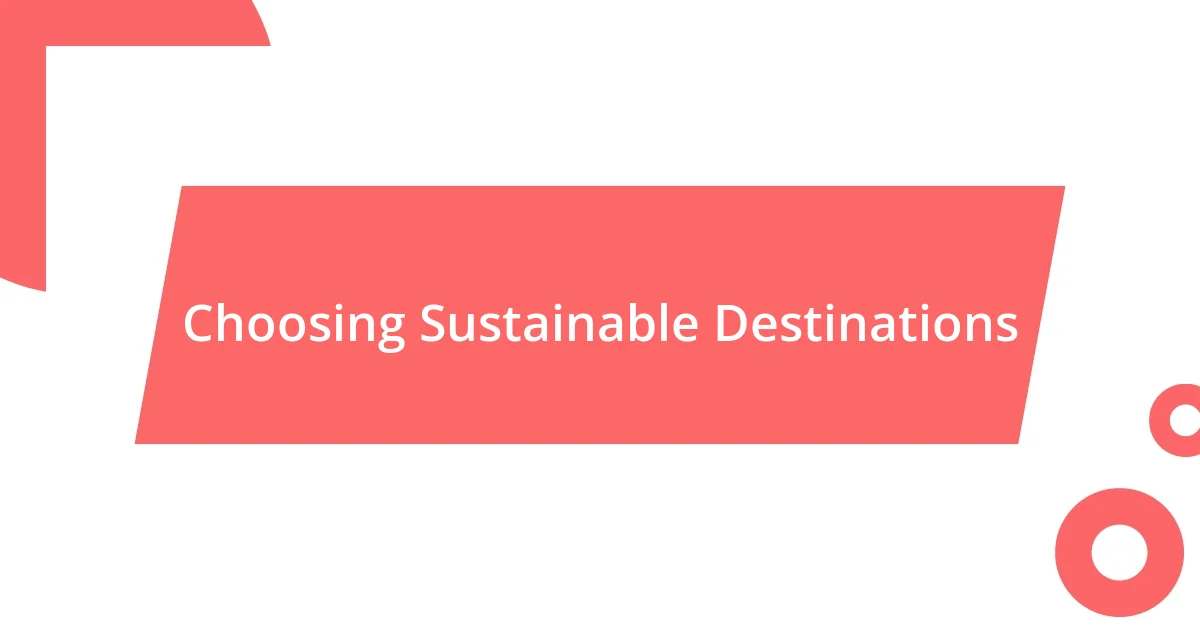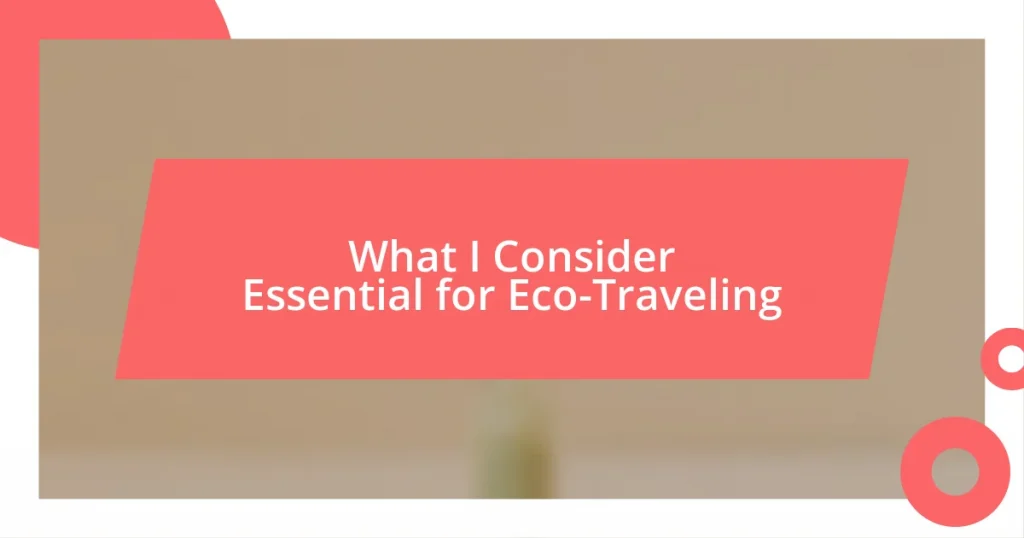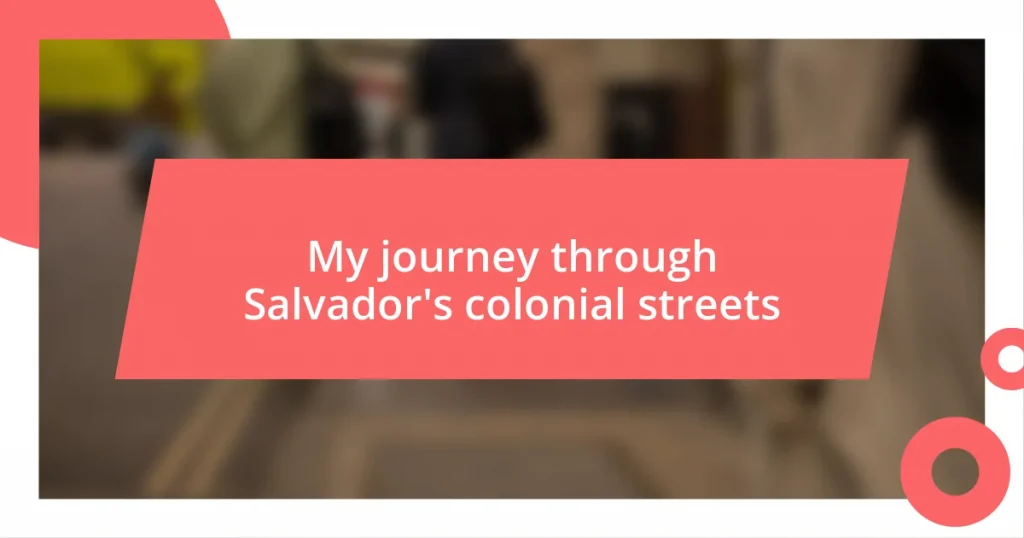Key takeaways:
- Eco-traveling emphasizes sustainability, supporting local communities, and minimizing carbon footprints through mindful choices and eco-friendly practices.
- Choosing sustainable destinations and participating in local initiatives enriches travel experiences while promoting environmental conservation and community support.
- Practicing responsible wildlife interactions and reflecting on one’s travel impact helps nurture ecosystems and respects the heritage of local cultures.

Understanding Eco-Traveling Principles
Eco-traveling principles are rooted in sustainability and respect for the natural environment. I remember trekking through a lush rainforest in Costa Rica, where our guide reminded us that every step we took impacted the delicate ecosystem. This experience made me reflect on how our choices can either harm or protect these precious spaces.
Another fundamental principle is supporting local communities. When I stayed at a locally-run eco-lodge in Thailand, I felt a genuine connection to the people and their culture. It struck me how my presence there not only enriched my experience but also provided income and resources for the community, creating a cycle of mutual benefit. Isn’t it wonderful to think that our adventures can contribute to the livelihoods of others?
Lastly, minimizing our carbon footprint is essential in eco-traveling, which requires mindfulness in everything from transportation to waste generation. On a recent trip, I opted for a bike instead of a car to explore the city, and the fresh air coupled with an intimate encounter with the surroundings was exhilarating. How often do we consider how small changes can ripple out to make a big difference in preserving the beauty we all seek to experience?

Choosing Sustainable Destinations
When I think about choosing sustainable destinations, I often reflect on how the place’s reputation for eco-friendliness significantly impacts our travel experience. For instance, I once traveled to a small village in the Azores, where their commitment to sustainability was palpable—solar panels powered homes, and local farmers practiced organic farming. This dedication to preserving the environment inspired me to be more conscious of my own ecological footprint. Have you ever visited a place that truly prioritizes sustainability?
My journey has taught me that it’s also about consciously seeking out local initiatives and supporting conservation efforts. I remember volunteering at a marine restoration project in Belize, and being amazed by how the local community worked tirelessly to protect the barrier reef. Seeing their passion first-hand made me appreciate the importance of choosing destinations that not only welcome tourists but also educate them on protecting their unique environments.
Additionally, the destination’s access to natural resources and wildlife plays a crucial role. I spent a week camping in the Canadian Rockies, where each day brought breathtaking views and the chance to spot diverse wildlife. It struck me how vital these ecosystems are and how much we need to choose places that actively engage visitors in nature conservation. Wouldn’t it be great if every destination made environmental responsibility a top priority?
| Destination | Sustainable Practices |
|---|---|
| Azores | Solar energy use, organic farming |
| Belize | Marine conservation projects |
| Canadian Rockies | Wildlife protection initiatives, camping regulations |

Packing Eco-Friendly Travel Gear
Packing eco-friendly travel gear is a crucial step towards minimizing our impact on the planet while exploring new places. I remember the excitement of unpacking my gear before a recent trip—each item a conscious choice. I felt a sense of pride knowing I was carrying a reusable water bottle, biodegradable toiletries, and a solar-powered charger. These small decisions greatly reduce plastic waste and environmental strain during our travels.
Here’s a quick checklist of what to consider for eco-friendly packing:
- Reusable Water Bottle: Prevents single-use plastic waste.
- Biodegradable Toiletries: Helps reduce pollution and landfill waste.
- Solar-Powered Charger: Reduces reliance on non-renewable energy sources.
- Eco-Friendly Clothing: Look for materials like organic cotton or recycled fabrics.
- Natural Insect Repellent: Safer for both you and the environment.
- Lightweight Backpack: Opt for durable and sustainable materials to reduce bulk.
On my last hiking adventure, I packed an eco-friendly backpack made from recycled materials. As I trekked through mountain trails, I felt reassured knowing my gear’s production didn’t come at the cost of our planet. That feeling of being part of something bigger, of contributing to a sustainable future while enjoying nature, is simply priceless. What gear will you choose to make a positive impact on your travels?

Reducing Your Carbon Footprint
Reducing your carbon footprint while traveling is a commitment I take seriously. One memorable trip was to the breathtaking fjords of Norway, where I opted for public transport instead of a rental car. I discovered that taking the train not only minimized my emissions but also allowed me to appreciate the stunning landscapes in a way that driving never could. Have you considered how choosing different modes of transport can impact your overall footprint?
Incorporating local experiences into my travels has also been a way to resonate with the environment. During a cycling tour through the vineyards of Tuscany, I found that pedaling along winding roads led to breathtaking views and a genuine connection with the land. This method of travel emphasizes sustainability and allows me to contribute positively to the communities I explore. I can’t help but wonder, how often do we overlook the chance to immerse ourselves in local culture while lowering our environmental impact?
Furthermore, I’ve learned the importance of being mindful about my energy consumption while traveling. I always choose accommodations that prioritize energy efficiency, such as places with solar energy or stringent recycling practices. On a recent stay at an eco-lodge in Costa Rica, I marveled at how they implemented energy-saving features, from energy-efficient lighting to composting toilets. It made me realize that even small changes can lead to significant impacts, both for the environment and my travel experience. Have you considered how your lodging choices can align with your eco-friendly values?

Supporting Local Communities
Supporting local communities during our travels is one of the most enriching experiences I’ve encountered. On a recent journey to a small coastal town, I chose to stay at a locally owned guesthouse instead of a big chain hotel. The warm hospitality and authentic connection with the owners truly transformed my visit, offering insights into their way of life that I would have missed elsewhere. Have you ever considered how such simple choices can create a lasting impact on a community?
I also make it a point to dine at local restaurants that feature traditional dishes. During my visit to a vibrant market in Thailand, I tried a dish made from ingredients sourced that very morning. The flavors were incredible, but even more satisfying was knowing my meal directly supported local farmers and vendors. It left me wondering: how often do we miss the chance to enjoy a meal that contributes to the local economy and culture?
Participating in community-based tours has also been a game-changer for me. On a trip to a rural village in Ecuador, I joined a workshop led by local artisans. Not only did I learn valuable skills in crafting traditional jewelry, but each payment went straight into their hands, supporting their craftsmanship and livelihoods. This experience made me reflect on the importance of valuing local knowledge and traditions. Have you thought about how you can engage with communities in a way that respects and enhances their heritage?

Practicing Responsible Wildlife Interactions
Practicing responsible wildlife interactions is crucial for preserving the delicate balance of nature. I remember standing quietly in a national park, surrounded by majestic elephants at a safe distance. The sheer awe I felt in witnessing their natural behavior firsthand was unparalleled. But it also struck me that, had I ventured too close, I could disrupt their habitat or cause them stress. How often do we prioritize our own need for a closer look over the well-being of these incredible creatures?
During a trip to the Galapagos Islands, I was struck by the importance of not feeding wildlife. I witnessed fellow travelers tossing snacks to the sea lions, which not only altered their natural hunting behaviors but also put them at risk of a poor diet and illness. It reinforced my belief that respecting established guidelines and regulations is essential. Have you ever considered how seemingly small actions can ripple out and affect an entire ecosystem?
In my experience, engaging in responsible wildlife tourism means supporting ethical sanctuaries rather than exploitative attractions. On my visit to a wildlife rehabilitation center in Thailand, I learned about the rescue efforts for injured animals and how they were being prepared for eventual release back into the wild. It was heartwarming to see these animals cared for, knowing I contributed by choosing to visit rather than a traditional zoo. Reflecting on that experience made me think: what choices can we make to ensure our enjoyment doesn’t come at the cost of the wild?

Reflecting on Your Travel Impact
Reflecting on my travel impact starts before I even embark on a journey. I often find myself pondering how my choices affect the places I visit. For instance, I once chose to explore a less-traveled island, where I could see firsthand how my presence contributed to the preservation of local ecosystems. It made me realize: am I simply a tourist, or can I be a steward of the destinations I cherish?
On a memorable hiking trip through a stunning national park, I became acutely aware of my footprint on the environment. As I navigated the trails, I noticed the efforts taken to conserve the area, from informative signage to designated paths. This led me to contemplate: what legacy am I leaving behind? Are my actions fostering sustainability, or are they contributing to wear and tear on these beautiful landscapes? Each decision I make, from sticking to trails to minimizing waste, resonates far beyond my immediate experience.
After returning home, I often take time to evaluate the souvenirs I’ve collected. I vividly recall my visit to a craft market where I chose handmade items from local artisans. Reflecting upon that moment, I realized that every purchase I made bolstered their craft and culture. It made me question how my spending habits impact the artisan’s livelihood. How can I ensure that my memories serve not just as personal treasures, but also as a form of support for the communities that welcome travelers like me?














